United Effort To Try And Help Wisconsin Farmers And Their Families

University of Wisconsin-Madison Division of Extension and the Southwestern Wisconsin Community Action Program (SWCAP) are partnering with agencies, organizations and others to provide education, resources, and support to Wisconsin farmers, ag service professionals, mental health, and healthcare providers to mitigate farm stress and reduce suicide risk in rural communities.
In many Wisconsin farming communities, farmers, family members, or farmworkers face a lack of access to medical or mental health information, services, and treatment. Despite progress in recent years, there are continued barriers for those who want to seek care and support services because of stigma surrounding issues like depression, anxiety, substance abuse, or suicide risk.
Ongoing economic conditions continue to take a toll on Wisconsin’s farm families and others in local communities in the state’s ag service and supply sectors.
“Low prices and uncertainty for many of Wisconsin’s primary farm and food products over the last five years have created hardship and stress for many in our rural communities,” said Joy Kirkpatrick, UW Center for Dairy Profitability Outreach Specialist. “On top of that, the 2020 COVID-19 pandemic has compounded stress levels as we saw the ‘farm-to-table’ supply chains break down or get clogged up, especially in the spring and early summer of 2020, affecting farmers, workers, and consumers.”
These conditions have led to many concerns about the high levels of farm stress, health concerns, and increased suicide risk. A recent Wisconsin Department of Agriculture, Trade & Consumer Protection (DATCP) Dairy Producer Survey (March 2020) found that almost 10% of respondents have felt the need to access mental health services in the past year for themselves and/or a family member due to farming challenges.
Because of these needs, the University of Wisconsin has engaged with partners to provide education, support, and activities to support the state’s farming communities. Several efforts are led by UW-Madison Division of Extension, the College of Agriculture and Life Sciences, the School of Human Ecology, and UW-Platteville. Since 2019, Extension has focused resources on farm stress education which can be accessed through the Resilient Farms, Families, Businesses & Communities Resource Center. These focused efforts positioned University of Wisconsin to leverage efforts for two newly funded projects:
Farm and Ranch Stress Assistance Network (FRSAN)
UW-Madison Extension educators in the College of Agricultural and Life Sciences and UW-Platteville are partnering with DATCP’s Wisconsin Farm Center to focus on farm financial management and future planning through a newly funded multi-state project. The Wisconsin team joins Extension services and other organizations in the Midwest. This effort, the North Central Farm and Ranch Stress Assistance Center, is supported through the U.S. Department of Agriculture’s National Institute of Food and Agriculture (NIFA) Farm and Ranch Stress Assistance Network grant. Wisconsin joins the University of Illinois and Illinois Extension who will lead the 12-state collaborative. Over several years, the $7.2 million award will create and expand statewide access to financial, stress management, and mental health resources for farmers and other stakeholders. Wisconsin will receive over $400,000 to provide education and support to Wisconsin farmers, ag-related businesses, mental health, and healthcare providers to mitigate farm stress.
As a partner in the Wisconsin effort, the Wisconsin Farm Center will be creating farmer focus groups, developing and implementing mental health provider trainings, and assisting with other activities that focus on farmer mental health needs. “As stress among farmers continues to run high, we are excited to be joining with UW-Madison Extension and other partners to help Wisconsin farmers and their families overcome mental health related challenges through this unique collaboration,” said Jayne Krull, DATCP’s Farm Center Director.
Wisconsin Partnership Program
A second grant funded in October 2020, supports the farm stress, mental health, and medical care needs of farmers, families, and farmworkers in a five-county region of southwest Wisconsin. This project is led by the Southwestern Wisconsin Community Action Program (SWCAP) and is titled “Addressing Stressors, Preventing Farmer Suicide: Social Connectedness and Health.”
The project team includes SWCAP, UW-Madison Division of Extension, the College of Agricultural and Life Sciences, and the School of Human Ecology’s Center for Community and Nonprofit Studies. The $1 million grant, over five years, will address mental health needs of Wisconsin farmers and workers. The projects goals include reducing suicide risk in this population. The team will work closely with farmers, community leaders, health professionals, and others to develop a range of activities and resources designed to build resilience and knowledge among families, local businesses, services, medical and mental health care providers and others. The project will support and empower rural residents to strengthen the social connections and to leverage educational efforts on farm diversification and financial stabilization.
This project is one of six grants funded by the Wisconsin Partnership Program at the University of Wisconsin School of Medicine and Public Health through its Community Impact Grants program. The projects were selected for their potential to create policy, environmental, and systems change that advance health equity and lead to equitable and sustainable improvements in health.
Together, these new Wisconsin projects seek to engage farmers, family members, workers, and the wide range of individuals that provide products, services, technical information and support to those in the industry who produce the food and farm products that keep us healthy and safe during these challenging times.
“We feel strongly that the answers to some of the concerns, barriers and challenges in our state’s farming communities are embedded within those in our communities,” said John Shutske, Director, UW Center for Agricultural Safety and Health. “In our rural areas, there is an incredible gold mine of wisdom, experience, and knowledge. But, because of changes in technology, an aging population, and other shifts, it’s not always possible for ideas and actions to ‘come together’ especially across geographical and time barriers. Our job will be to help communities and leaders to weave resources together in ways that benefit us all.”
WPA Seeking Youth Pig Project Sponsors
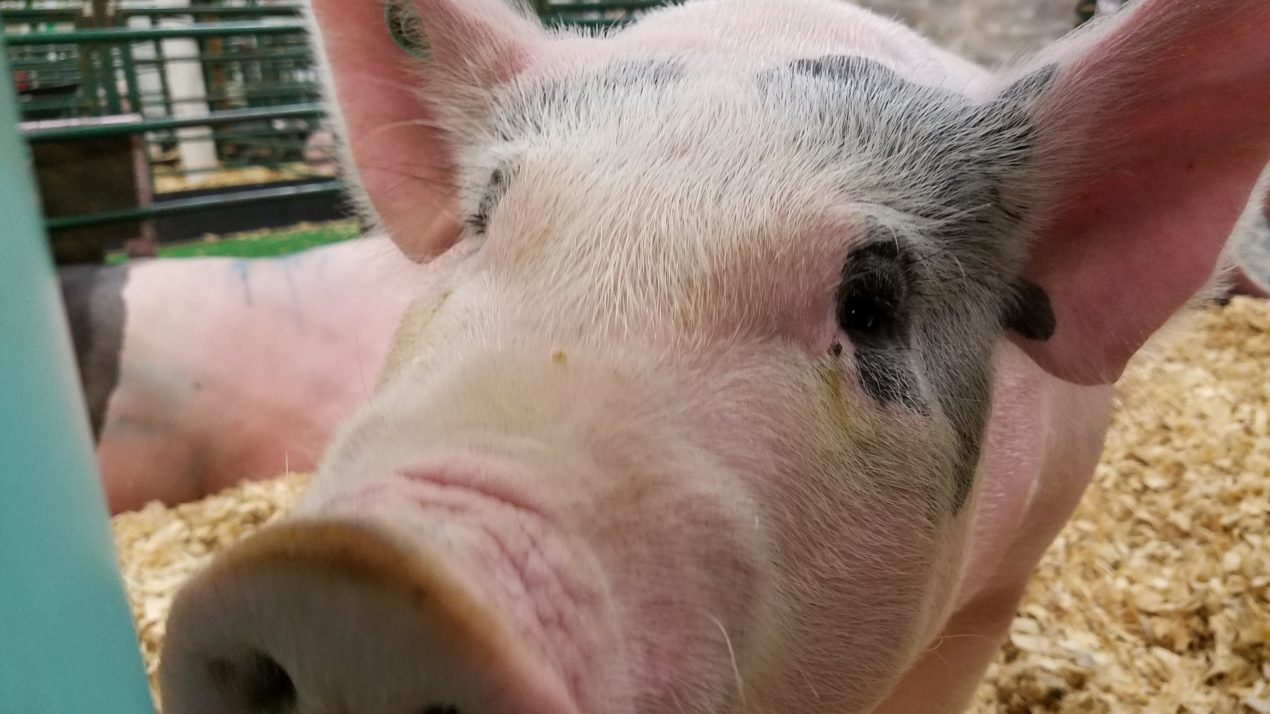
Wisconsin Pork Association (WPA) is accepting sponsorships for the 2021 Youth Pig Project. Since 2003, WPA has offered Wisconsin 4-H and FFA Youth $50 scholarships to help offset the costs associated with their pig projects. The scholarship program, developed and led by the WPA Youth Committee, is designed to assist youth in establishing swine projects that can lead to the development of life skills and career opportunities in the Wisconsin pork industry.
Pig producers can become a blue, red, or white sponsor by contributing $100, $75, $50 or give an amount of their choosing. Sponsors will receive recognition of their support through WPA news releases, the website, Pork Express e-newsletter and Headlines newsletter. All sponsors will be listed in a letter to the applicants and blue ribbon sponsors may list their sale date(s) on the WPA website calendar.
The project requests applicants to outline their project goals, develop a budget, and explain why they should receive the scholarship. They must also describe their future goals in the pork industry. Last year, WPA received 85 applications and awarded 46 youth pig project scholarships thanks to WPA sponsors.
“I want to thank you for doing this for kids like me. I was not able to show and sell my hog at the fair, but I donated the pig and all processing to a family in need.”– 2020 Scholarship Award Winner
To sponsor, visit WPA’s website at www.wppa.org. Please submit sponsorship information to Wisconsin Pork Association by December 1, 2020. If you have any questions or would like more information, please call the WPA office at 608-723-7551 or email [email protected]
Project to expand supply chains for regional grains to local cafeterias
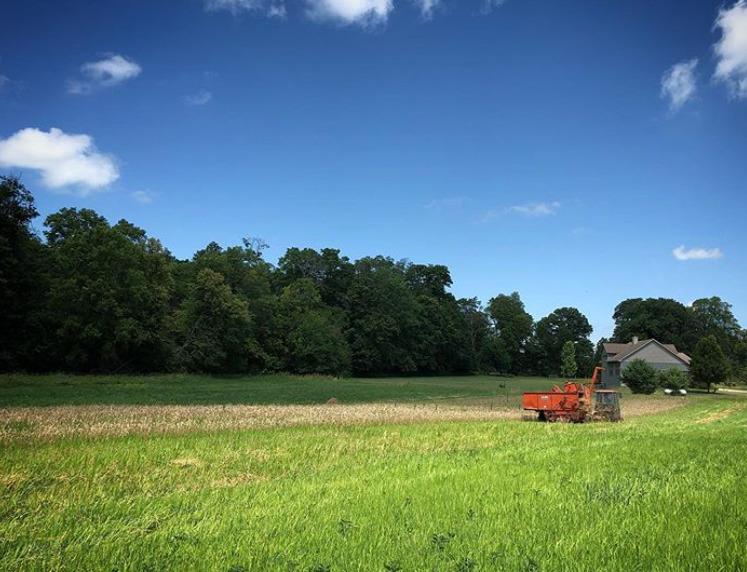
Farm to institution, the practice of purchasing locally grown foods in the foodservice setting at schools, hospitals, colleges and business campuses, is a growing movement that supports area farmers and increases meal quality. Institutions represent a significant potential market opportunity for grain growers who currently struggle with market access. And while many institutions already purchase grain in many forms, they may currently lack the relationships, staff capacity, and culinary confidence to choose locally grown grain. A newly funded project aims to create tools and support to help increase the ease of use of delicious regionally produced grains in local institutions.
The Center for Integrated Agricultural Systems (CIAS) at the UW–Madison College of Agricultural and Life Sciences was recently awarded a $516,000 grant through the USDA Agricultural Marketing Service’s Farmers Market Promotion Program to address this work. The three-year project, titled “Grains to Institutions: Expanding Value Chains and Cultivating Resources for Upper Midwest Grain Growers,” will work in partnership with Artisan Grain Collaborative (AGC) and Upper Midwest grain producers, processors, and Wisconsin partner institutions to create multifaceted resources for regional farmers and foodservice audiences nationwide.
This project will develop a suite of resources for entities across the grain value chain from growers to buyers to accelerate procurement of local grains and continue to grow farm to institution efforts. Planned resources include an institutional culinary toolkit including explanations of different local grains; information about storage, processing, and cooking; and new cafeteria-friendly recipes. These materials will be complemented by farmer stories about how and why producers choose to grow these grains, an analysis of available processing and supply chain infrastructure, and recommended strategies for on-farm grain cleaning, sorting, and processing for institutional end-users.
“The importance of building a regional grain value chain has become particularly evident throughout the COVID-19 pandemic, as farms and mills have stepped up to fill grain and flour shortages created by bottlenecks in global supply chains and the consolidated processing infrastructure,” says Brianna Fiene, CIAS Farm to Institution Outreach Specialist. “This project presents an opportunity to expand existing efforts to connect grains to people in public and community settings throughout Wisconsin and the Upper Midwest, including hospitals, colleges and K-12 schools.”
This project directly addresses infrastructure needs and leverages established relationships through the Wisconsin Farm to School Network, AGC’s Producer Collaboration Working Group and other regional grain organizations to support more farms in getting grain out of the field and onto the trays of students, workers and patients. For more information contact: Brianna Fiene, [email protected].
You’re Not Done With That Garden Yet
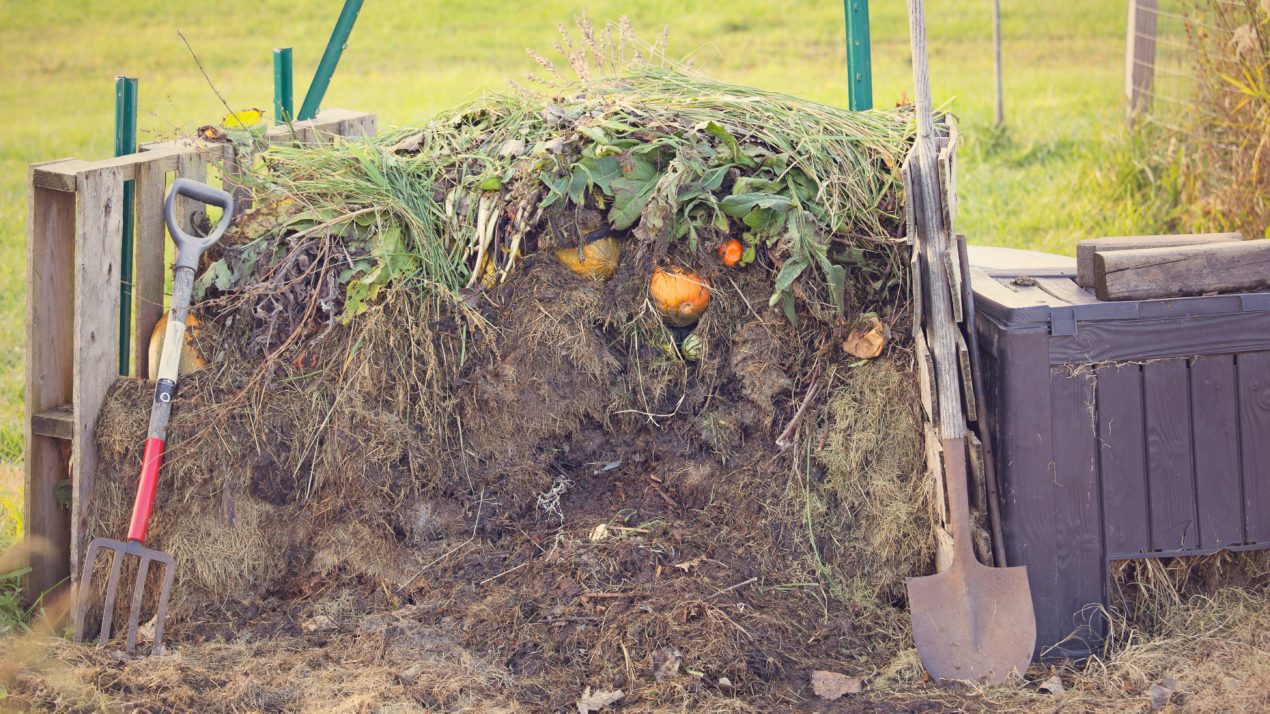
Although weather in Wisconsin may have put an end to the growing season, that doesn’t necessarily mean you’re done with your garden.
Mindy Habecker, Dane County UW-Extension Natural Resources Outreach Specialist has been an instructor for the Master Composter program for a number of years. She suggests you think about what you can still harvest from your garden in the form of compost materials.
Habecker says that there’s actually some specific science you need to keep in mind if you want your composting efforts to pay off. First, make sure the compost pile itself is manageable! 3X3X3 is a good place to start. 3 feet high, wide and deep for that compost container or pile, otherwise she suggests working with windrows to get your best mix.
And what about that mix? Habecker says almost anything can be incorporated into the compost pile if you just remember to keep some simple science principles in place. The pile itself has to have active biology – meaning everything has to get along. Ample moisture is key to helping components break down and begin fermentation. Yard clippings can be layered in with food waste, as well as garden materials, to get the process moving.
Habecker does advise to be careful with food waste! If you don’t want four-legged visitors in your compost pile, keep out food waste like meat, dairy, and fats. They will not assist your compost breakdown.
Habecker will be presenting more instruction on putting together your best compost combination during a fall “Green Thumb Gardening” series on Monday, November 9th from 6-8 p.m. Register here.
Ecological Restoration Institute Opens at UW-River Falls
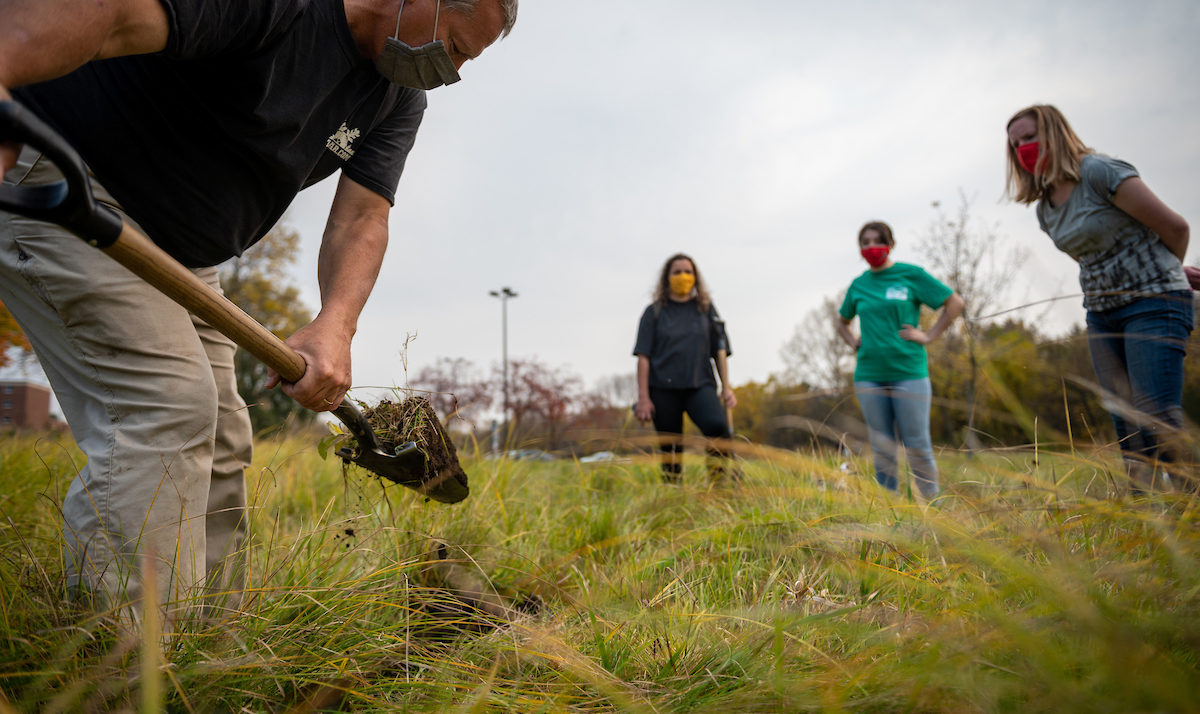
A cutting edge Ecological Restoration Institute has opened in the College of Agriculture, Food and Environmental Sciences at the University of Wisconsin-River Falls. The mission of the institute, part of the Plant and Earth Science Department, is to enhance student skills in natural resource management through hands-on trainings/certifications, as well as teaching and work experiences associated with restoration projects.
“We are incredibly grateful for the vision and commitment of the donors in supporting the development of this cutting-edge institute that will provide high-impact experiences for students in conservation and environmental science and help them develop professionally,” said geology and soil science Professor Holly Dolliver, chair of the Plant and Earth Science Department.
Trainings and certifications will increase the eligibility, qualifications and marketability of students for jobs in natural resources. A selection of the available certifications includes boat safety training, chainsaw safety course, first aid, tractor training and wildland firefighter training.
Restoration projects will provide students with essential field experience that can be applied to their future careers. One of the current projects involves the management of the open field behind the Agricultural Science building and the greenhouse on campus. The project will offer students experience in restoring native plants and utilizing management practices such as herbicide application, prescribed burning, invasive species removal and water table monitoring. Students will be involved in this project throughout the 2020-21 academic year and beyond.
“I’m excited to be joining UWRF and the Plant and Earth Science Department with this unique opportunity for their students,” said Kelsey Cowart, project manager for the Ecological Restoration Institute. “The Ecological Restoration Institute is an incredible resource for students to jump start their careers. We are fortunate to offer this program and I look forward to collaborating with many students and faculty throughout the process.”
The institute is funded through the Environmental Studies Opportunity Fund, a fund created and sponsored by donors to the University Foundation. The fund also provides scholarships to students majoring in conservation and environmental science.
More information about the Ecological Restoration Institute is available at www.uwrf.edu/PES/ERI.cfm or email [email protected].
Wisconsin Farm Bureau Applauds Gray Wolf Delisting
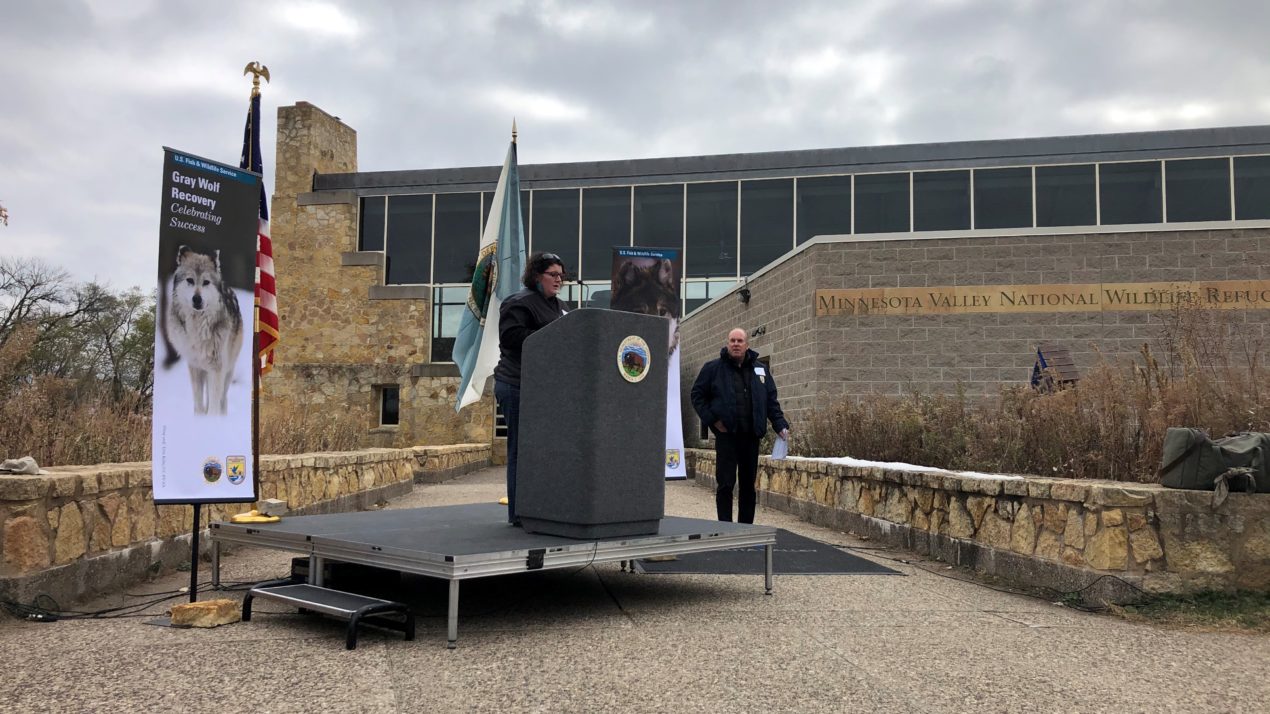
On October 29, the Department of Interior announced the delisting of gray wolves from the Endangered Species List in the Upper Great Lakes region at an event hosted at the Minnesota Valley Wildlife Refuge in Bloomington, Minnesota.
“Wisconsin farmers and rural residents have dealt with nightmare situations with wolf attacks on pets and livestock and even wolf sightings as children play in the yard or wait for the school bus,” said WFBF President Joe Bragger. “We applaud the Department of Interior for this long overdue announcement that will return gray wolf population management authority back to the state DNR.”
WFBF member and District 8 Coordinator Ashleigh Calaway was asked to provide brief testimony during the Department of Interior’s announcement event.
“I had heard about wolf attacks in the Northwoods of Wisconsin but never dreamed it would happen to us,” Calaway shared. “As a farmer, I don’t want to see the wolf population eliminated, but I do want to see the wolf population managed so we can coexist in harmony.”
Wisconsin’s gray wolf population has grown from 14 in 1985 to more than 1,000 as of the latest DNR count in the spring of 2020.
Bragger added, “This is a wolf management success story. We have successfully managed the wolf population beyond the recovery goal of 350 animals statewide. We now ask that the Wisconsin DNR establish a hunting season to keep the wolf population at a healthy level.”
$6 Million Pledged for Child Agricultural Injury Prevention
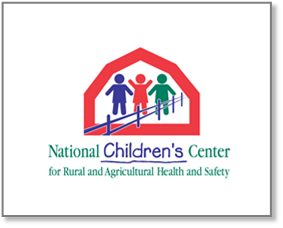
The National Institute for Occupational Safety and Health (NIOSH) has awarded the National Children’s Center for Rural and Agricultural Health and Safety, Marshfield Clinic Research Institute, a competitive grant renewal of $6 million over five years to continue the center’s mission of childhood agricultural injury prevention.
New studies being launched address youth operating ATVs for farm work, adolescent mental health, the impact of available childcare on safety practices, and other safety issues important to the agriculture community.
“Childhood agricultural safety has never been more important than now during the coronavirus pandemic,” said Barbara Lee, Ph.D., National Children’s Center director. “Children are spending more time on farms, which can be positive from a family perspective, but it also increases their exposure to farm hazards and raises supervision challenges with home-schooling and closure of many child care centers.”
The National Children’s Center is one of 11 agricultural centers funded by NIOSH, Centers for Disease Control and Prevention. It is the only center dedicated to childhood agricultural injury prevention. NIOSH announced the renewal Oct. 1.
Although the rate of non-fatal injuries to children in agriculture has declined since the National Children’s Center was established in 1997, agriculture remains hazardous for children and youth. About every three days, a child dies in an agriculture-related incident, and each day, about 33 children suffer preventable injuries. During the past decade, youth worker fatalities in agriculture have exceeded all other industries combined.
“By working with our partners in agriculture, including farm parents, businesses and organizations, we’re helping ensure that safety interventions and guidelines are sustained beyond the span of the grant period,” Lee said.
The new grant includes six distinct research studies, an outreach program, administrative and core leadership, and a national stakeholder advisory board.
Principal investigators within the Research Institute include Lee; Casper Bendixsen, Ph.D.; Bryan Weichelt, Ph.D.; Marsha Salzwedel, Ed.D.; Florence Becot, Ph.D.; and Jeffrey VanWormer, Ph.D. External principal investigators are Farzaneh Khorsandi, Ph.D., and Fadi Fathallah, Ph.D., University of California-Davis; Shoshanah Inwood, Ph.D., Ohio State University; and Josie Rudolphi, Ph.D., University of Illinois. Andrea Swenson, Ph.D., will oversee evaluation of the center’s process, outcomes and impact.
The center will continue to partner with Migrant Clinician’s Network, working with Amy K. Liebman, M.P.A., and her team of professionals dedicated to improving the health of migrant farmworkers and other mobile underserved populations.
The projects:
- “Surveillance of Medically Attended Agricultural Injuries in Farm Children” (VanWormer)
- “Linking Childcare to Farm Children Safety” (Becot)
- “Farm Kid Paradox: Anthropological Inquiry Into The Benefits and Risks of Child-Livestock Interaction” (Bendixsen)
- “Assessing the Impact of Traumatic Injury News Articles on Farm Mothers and Educators” (Weichelt)
- “Farm Adolescent and Mental Health” (Rudolphi)
- “Capabilities and Limitations of Youth Operating Agriculture All-Terrain Vehicles” (Khorsandi and Fathallah)
- “Outreach Core” (Salzwedel)
The National Children’s Center is also supported by Marshfield Clinic Health System and through generous donations and other grants.
Annual Badger Swine Symposium Happening November 5th

Wisconsin may be known as the dairy state, but ties to swine production in Wisconsin run deep. Historically, immigrant populations demanded pork for the manufacture of sausage and other products, leading to as much as 80% of all Wisconsin farms having pigs on the farm in the early twentieth century. Pig farming looks different today with less total farms that have pigs on them, but raising pigs continues to be an important part of agriculture in Wisconsin.
The seventh annual Badger Swine Symposium is being held virtually Thursday, November 5, 2020. With the shift to virtual this year due to the pandemic, we are restructuring the program to run around the lunch hour from 12 pm to around 2:15 pm. The program is free to attend, but you must be registered by November 3. In acknowledgement of the change to format for the symposium this year, some research updates will be pre-recorded and available for viewing on Monday, November 2. Pre-recorded sessions can be found at https://livestock.extension.wisc.edu/programs/badger-swine-symposium/.
The live portion of the symposium will kick off at 12:00 pm. The day will start off with a market update from Brenda Boetel, Professor and Agricultural Marketing Specialist with UW-River Falls. Following the market update will be a panel discussion of industry stakeholders on how COVID has affected their operations, markets, and management. To wrap up the discussion, Jeff Swenson of the Wisconsin Department of Agriculture, Trade and Consumer Protection, will talk about how Wisconsin has developed additional plans, resources, and community connections in response to the potential need to implement mass euthanasia of swine due to limited slaughter plant capacity. Please note that these live sessions are not being recorded.
Additional speaker information, a registration brochure, and other details can be found at https://livestock.extension.wisc.edu/programs/badger-swine-symposium/. You may find the registration link here, or you can register directly at http://bit.ly/20BadgerSwine. This program is sponsored by the Animal and Food Science Department at UW-River Falls, School of Agriculture at UW-Platteville, Animal and Dairy Science Department at UW-Madison, the Extension Swine Team and the Wisconsin Pork Association.
Potato Sales Exceed 5-Year Records
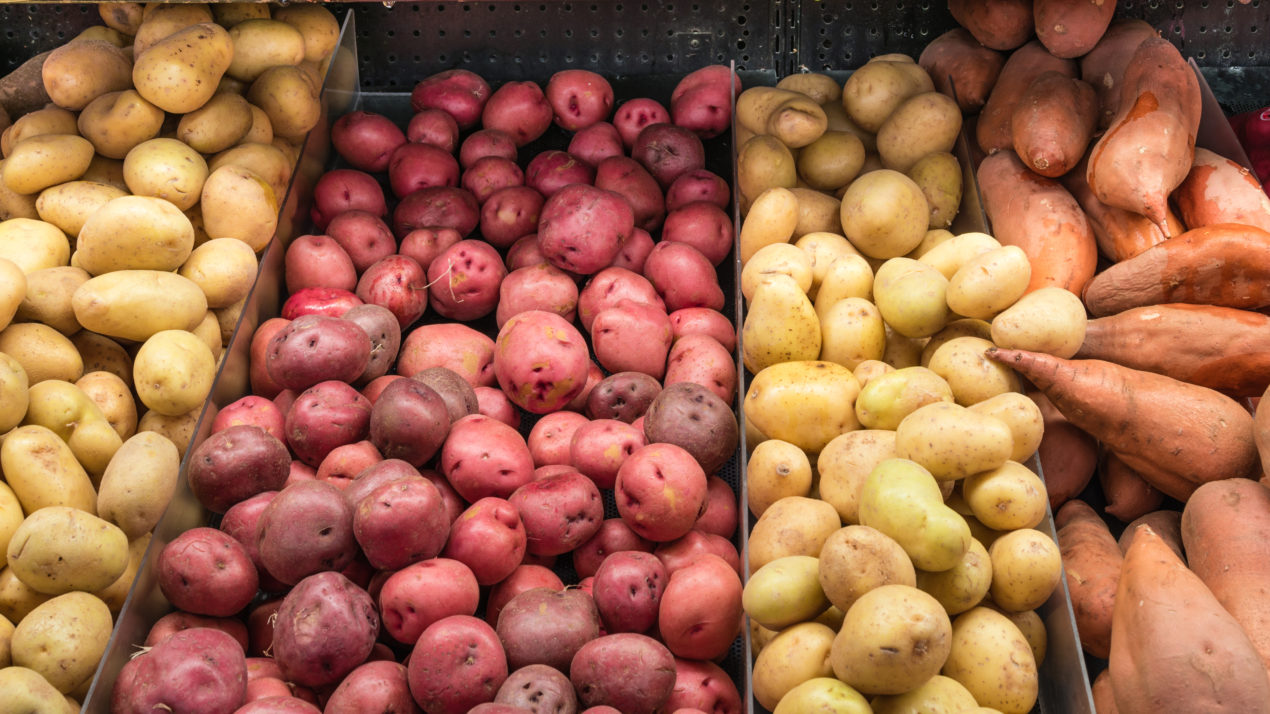
This article originally appeared in the WPVGA’s “Tater Talk” Newsletter.
Record potato sales continued at retail from July through September 2020. Total store potato sales increased by 13.6% in dollar sales and 10.6% in volume sales, compared to the same time frame in 2019. These sales levels are also the highest they have been for the past five years.
Frozen potatoes showed the greatest increase compared to a year ago, with a dollar sales increase of 23.9% and a 19.7% increase in volume sales. The only category that declined compared to a year ago is deli-prepared sides; however, the category decline slowed compared to the previous three months.
Fresh potatoes sales increased 16.4% in dollars and 10.6% in volume, despite the consumer price increasing. Medley, petite, and yellow potatoes all had a volume sales increase over 20%. While consumers still purchased more five-pound bags than any other package size, ten-pound bags saw the largest increase in dollars and volume sales by 22% and 20.4%, respectively. Bags larger than ten-pounds grew in dollar sales but were the only category to fall in volume sales with a 9.1% decline.
These figures are compiled by IRI. Potatoes USA accepts no liability for the content of these reports, or for the consequences of any actions taken on the basis of any information contained herein. Please reach out to [email protected] with any questions.
Farm Bureau’s Legislative Advocacy Training Goes Virtual

Wisconsin Farm Bureau Federation’s Promotion and Education Committee’s Leadership Boot Camp on November 14 will now be hosted virtually. WFBF’s governmental relations team will lead the training focused on engaging in legislative advocacy at the local level.
“We are excited to offer the same high-quality content without the need to travel and while keeping everyone’s health and safety in mind.” said Darby Sampson, WFBF’s Promotion and Education Committee chair. “I encourage Farm Bureau members to attend this Leadership Boot Camp to learn how each of us can best make an impact on legislative issues.”
The training will begin with information on local affairs and how to monitor activities at the town and county level. Training will continue with tips for contacting elected officials and how members can best make an impact on local, state and federal legislation.
The Leadership Boot Camp is free of charge and open to all Farm Bureau members. The registration deadline is November 11.
For more information, or to register, visit wfbf.com/leadership-boot-camp.
Wisconsin Farm Bureau Federation is the state’s largest general farm organization and is made up of 61 county Farm Bureaus. WFBF represents farms of every size, commodity and management style.

